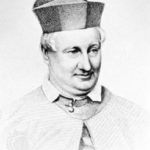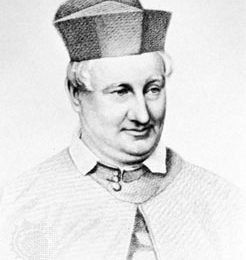The post of January 18th covered the notion of the “youthfulness of God” as evidenced in His creation. G.K. Chesterton also spoke of another aspect of God, which is often overlooked, the idea of His “mirth.”
“Joy, which was the small publicity of the pagan, is the gigantic secret of the Christian. And as I close this chaotic volume I open again the strange small book from which all Christianity came; and I am again haunted by a kind of confirmation. The tremendous figure which fills the Gospels towers in this respect, as in every other, above all the thinkers who ever thought themselves tall. His pathos was natural, almost casual. The Stoics, ancient and modern, were proud of concealing their tears. He never concealed His tears; He showed them plainly on His open face at any daily sight, such as the far sight of His native city. Yet He concealed something. Solemn supermen and imperial diplomatists are proud of restraining their anger. He never restrained His anger. He flung furniture down the front steps of the Temple, and asked men how they expected to escape the damnation of Hell. Yet He restrained something. I say it with reverence; there was in that shattering personality a thread that must be called shyness. There was something that He hid from all men when He went up a mountain to pray. There was something that He covered constantly by abrupt silence or impetuous isolation. There was some one thing that was too great for God to show us when He walked upon our earth; and I have sometimes fancied that it was His mirth.” (G.K. Chesterton, the last paragraph of Orthodoxy)
This makes sense. How could Jesus have called to His disciples, “Come, follow me” with a look of anger, fear, or sadness? Jesus had to have possessed some sort of expressed interior happiness. He must have possessed the happiness of innocence (as He was innocent). It might be called the happiness of childhood, which adults throw out with their toys. Spend a few minutes with children, remembering that Our Lord clearly stated that we must become like them to enter the Kingdom of Heaven. Note that they play about joyfully. Occasionally they will have a “melt down,” throw a toy, fight with their neighbor, spill milk, or generally lose their “good form.” But, here’s the rub: they immediately pull themselves together, usually after a hug from their mother (Mary is our mother), smile, make a mental adjustment, and go back to play (work). They do not lay about remembering their falls, and misdemeanors. They immediately return to their natural state which is a general approach to life which is filled with trust and confidence in the love of their parents (God is our father). St. Francis de Sales, the gentle saint, wrote a bit about this general approach to life, which, indeed, is not easy to attain in daily life which is filled with adult concerns and worries, but nonetheless, it is something to consider:
“When you find your heart growing sad, divert yourself without a moment’s delay; make a visit, enter into conversation with those around you, read some amusing book, take a walk, sing, do something, it matters not what, provided you close the door of your heart against this terrible enemy. As the sound of a trumpet gives the signal for a combat, so sad thoughts apprise the devil that a favorable moment has come for him to attack us.” (St. Francis de Sales)
G.K. Chesterton did not say that Christ did not cry. He said the complete opposite (see quote, above). The Gospels make it quite clear that Christ cried, and expressed, and felt, sad sentiments. He did not advocate for a false Christianity where a person must have a smile plastered to their face, but what he did say is that behind the transitory moments of sadness, and pain, there lies a mysterious joy, the mirth of God. Christians experience this joy in experiencing forgiveness, in the joy of receiving absolution after sacramental Confession, in the joy of returning to the innocence of childhood following that kind sacrament, and in the joy of knowing they are sustained in life by the love of God. That is the secret joy of the Christian. That is the pearl of great price; to know God, to live in communion with Him, and to reach inner peace in Him through His beloved Son, Christ Jesus.
I sometimes fancy (as Chesterton would have said) that God expressed His mirth in His first miracle: turning water into wine. What a terribly Catholic thing to do! What a great joke did He play on those crippled souls who use religious pretexts to denounce the simple joys of the Shire! What will they think when they enter the Kingdom of God and find the souls toasting about a great table while recounting stories of their heroic deeds, and the noble acts of God! (Hail J.R.R. Tolkien!)
Look about the world today. The mirth of God remains in evidence (why does the Moon have a face?:)).
God has not changed, nor ever will.
•SCF






